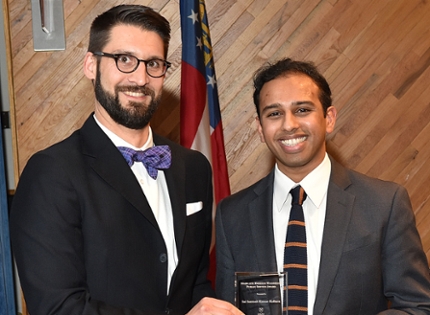Kolluru inspired by refugees, White House, and law and religion scholars
By CSLR | Emory Law | Feb 12, 2018 12:02:00 AM

Sai Santosh K. Kolluru (JD 2018) received the 2018 Mark and Rebekah Wasserman Public Service Award as part of the Emory Public Interest Committee (EPIC) Inspiration Awards. Kolluru is chief of staff and assistant managing editor of peer review for the Journal of Law and Religion, where he works under the direction of Silas W. Allard, managing editor and CSLR associate director.
“Sai Kolluru has impressed me immensely during his time at Emory, particularly in his dedication to social justice,” Allard said. “He has a bright future in public service, and if he contributes a fraction of what he has contributed to Emory Law, we will all benefit.”
Kolluru, who holds a bachelor of science in mechanical engineering from Case Western Reserve University, serves as president of the Immigration Law Society and communications chair for the South Asian Law Students Association. He has hosted a weekly Meditation & Mindfulness for the Emory Law community and coordinated a clinic to support DACA students. He has taken the lead on policy matters for Emory Law’s International Refugee Assistance Project (IRAP) chapter.
Kolloru shared a bit about his journey from a child in the small village in southeast India to a law student planning a career in public service.
What did you do before you arrived at Emory Law? I worked in the Office of Public Engagement in the White House for an associate director and a director of special projects. I helped them organize briefings and presidential receptions while serving as a liaison between the American people and senior white house advisors. We focused on outreach to faith-based organizations, Arab-American communities, and anti-poverty groups. I learned hands-on from exceptional public servants who worked tirelessly to make sure every individual and organization who came to us with concerns were heard in the Obama administration.
Where did you start your law career? I attended my first year of law school at Ohio Northern University. The small town of Ada allowed me to make friends young and old with different ideologies and political and religious views and build strong bridges. That summer I worked at a mid-size firm, primarily working in the area of patent law and mechanical engineering.
What let you to Emory Law? The Journal of Law and Religion, experiential opportunities, distinguished alumni, and courses offered were the primary reasons I transferred to Emory. The openness and eagerness to create a diverse environment full of opportunities and dialogue not only allowed me to become more intellectually curious in the classroom but also to expand my potential to make an impact in the real world.
What sparked your interest in working with the Journal of Law and Religion? I have always been fascinated by law and religion, two of the most ancient ideas of human civilization. The JLR provided me not only the opportunity to work with world class scholars such as John Witte, Jr., Michael J. Broyde, Mark Goldfeder, and Silas Allard, but also an avenue to introduce my deep interest in bridging the Eastern faiths and the Western/American legal system, particularly in the field of Hindu/Dharmic ethics.
How did you get involved in the Immigration Law Society? As an undergraduate, I came across a group of Bhutanese refugees who have made a real impact on my life. Their harrowing experience living and surviving in refugee camps for over two decades and making it to the United States turned me toward my inner self, and I started to question and reflect upon my role in society. I know that my immigrant story could be someone else’s, and I want to do whatever it takes to make that a reality for others. This led me to iLaw, where I have had the great honor of serving alongside some of my most passionate peers, who care about law, policy, and people.
What do you like to do outside of school? Serving the community and our planet is close to my heart. Whether it is feeding homeless people, spending time with seniors, planting trees, or volunteering at an animal sanctuary, I enjoy giving back. You will also find me doing nothing and just being. I spend time practicing analytical and single-pointed meditation. Moments of isolation allow for mental clarity and help me sharpen my focus. They provide an opportunity to reflect and reassess my work and shortcomings.
What are your future plans? I plan on being a public servant and serving the American people. I will be joining a government honors program upon graduation where I hope to strengthen and expand my legal training while making a substantive difference in the lives of all Americans. I would also one day like to be a professor, although it may be a longshot. Teaching is a form of selfless service and shaping the minds of tomorrow’s leaders while contributing cutting-edge research would be an honorable way to continue my service to society.

